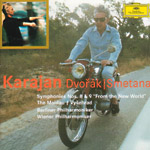Herbert von Karajan’s previous Vienna Philharmonic Dvorák Eighth (recorded for Decca in 1961) was notable for the conductor’s uniquely emphatic gesturing (particularly in the slow movement) and the luxuriant string sound he drew from the orchestra. This becomes a liability in this newer version, where Karajan’s string deluge nearly submerges the winds and brass, particularly in the first-movement development where you can barely hear the trumpet’s climactic restatement of the opening theme. There’s also less freedom of expression (not that there was an abundance before), and despite Karajan’s consistently energetic tempos (including a refreshingly brisk scherzo) this performance generates little real excitement.
DG would have done better to include Karajan’s last recording (1985, with the Vienna Philharmonic) of Dvorák’s New World Symphony. It features a rhythmic clarity and intensity lacking on the present Berlin Philharmonic performance from 1964, which also suffers from a weighty disposition at odds with the Czech composer’s ebullient spirit. Listen to Kubelik’s 1972 recording and you’ll be amazed at how he conjures a much more vibrant and idiomatic performance with this very same orchestra.
After the misfires on Disc 1, Disc 2 gets much closer to the target. Karajan’s 1959 Slavonic Dances (Op. 72 No. 8 beguiles with its heartfelt nostalgia) and Scherzo capriccioso exude a freshness and freedom of spirit seldom found in the conductor’s later work, while the two Ma Vlast selections benefit from his famed sense of operatic grandeur. Karajan’s Bartered Bride Dances offer much color and energy, but you’ll find more brilliance on the Reiner (RCA) and Szell (Sony) recordings. Disc 2 also features more natural recorded sound, while Symphony No. 8 tends to sound congested in tutti passages. So, it’s a half-desirable package (the rating mainly reflects Disc 2), which is not bad considering the two-for-one price.
































